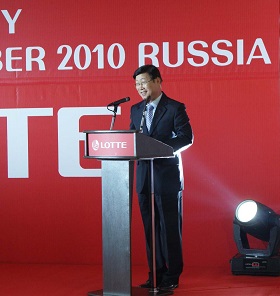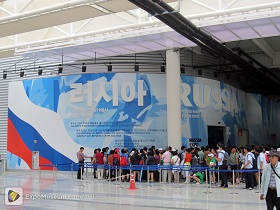Russian-Korean investment cooperation
13th Meeting of the Korea-Russia Joint
Commission on Economic, Scientific and
Technological Cooperation, July, 2013
(no votes) |
(0 votes) |
Doctor of Sciences (Economics), Head of Section of the Asia-Pacific Region Problems, IMEMO RAN
Compared to the Russian-South Korean trade recovery duringмthe beginning of the 19thcentury, current bilateral investment appears to be developing rather slowly and remains an extremely unbalanced area of cooperation between the two countries. What has been accomplished so far however can give a significant boost to bilateral trade and economic cooperation. Nevertheless this progress will be possible only if the reasons behind the current stagnation are correctly identified and ways to overcome existing problems found.
Compared to the Russian-South Korean trade recovery duringмthe beginning of the 19thcentury, current bilateral investment appears to be developing rather slowly and remains an extremely unbalanced area of cooperation between the two countries. What has been accomplished so far however can give a significant boost to bilateral trade and economic cooperation. Nevertheless this progress will be possible only if the reasons behind the current stagnation are correctly identified and ways to overcome existing problems found.
Lessons from Initial Investment Projects
At the end of 2012, the volume of South Korean investments into Russia reached $1.9 billion. In comparison, investment flows from Russia into South Korea appear rather modest. Over the past two decades, Russian investment into the South Korean economy totaled only $ 148.8 million (according to 2012 data), thereby not affecting the development of bilateral economic relations in any way [1].
It should be emphasized, however, that Russian investors (both public and private) areal together passive in the majority of East Asian countries. This is due to the fact that the formation and promotion of investment projects in the Republic of Korea as well as in other countries in the region has been hindered by a number of objective reasons. Among them, first of all, there has been a complete absence of experience in bilateral trade and economic ties, as well as a deficient amount of necessary commercial information and only a narrow circle of experts that have adequate knowledge of business opportunities for partners and about the economic potential of the other parties.
It should be emphasized, however, that Russian investors areal together passive in the majority of East Asian countries. This is due to the fact that the formation and promotion of investment projects in the Republic of Korea as well as in other countries in the region has been hindered by a number of objective reasons. Among them, first of all, there has been a complete absence of experience in bilateral trade and economic ties, as well as a deficient amount of necessary commercial information and only a narrow circle of experts that have adequate knowledge of business opportunities for partners and about the economic potential of the other parties.
At the same time, plans of South Korean investors have been hindered by challenges to their operations in Russia in the early 1990s. The most symbolic of these problems was the failed project to create a Russian-Korean industrial free economic zone Nakhodka approved in 1999 by the two governments, which collapsed because of problems on the Russian side (manifested in an organizational and legal mess) [2].
In addition, problems in bilateral relations have been aggravated by the existing Soviet debt to South Korea that Russia inherited. This burden directly or indirectly impedes the participation of South Korean banking and credit institutes in supporting the investment activities of South Korean companies in the Russian Federation. Only in 2004, in accordance with a bilateral agreement on regulating the debt problem, did the South Korean government approve a procedure for settling Russia’s debt (an estimated $ 2.24 billion) to South Korean private credit investors and lift the ban for the participation of banks in financial operations with Russian legal entities [3]. Thus the necessary full financial and credit conditions for implementing investment projects of South Korean companies in Russia were created only 14 years after the establishment of bilateral diplomatic relations.
Economic crises that affected almost simultaneously the South Korean (1997-1998) and Russian (1998) economies were another negative factor. Under such circumstances the atmosphere of mutual trust, which was just starting to form, was compromised for a long period of time.

Opening of the factory “Lotte”, the speech of
the Ambassador Extraordinary and
Plenipotentiary of Republic of Korea in Russia
Lee Yun-Ho
Nevertheless since the early 2000s, South Korea started to invest directly in such areas of the Russian economy as forestry, harvesting and processing of seafood, food processing, construction of home electrical appliances, car production and tourism. In this respect, a number of major investment projects with a value of more than $100 million each should be mentioned: the residential, business and shopping complex Lotte in Moscow, production of home appliances by LG Electronics in the Moscow region and by Samsung electronics in the Kaluga region, plants built by the car manufacturer Hyundai Motors in St.Petersburg and a chemical complex constructed by South Korea Chemical in Tatarstan [4]. Investments in the Russian Far East (in the oil and gas, forestry, residency, agriculture and automobile construction sectors) should be also taken into account. These investments have contributed to the transformation of the Russian Far East federal region into an important part of the bilateral trade and economic exchange: they account for 41% of Russian-South Korean trade [5].
At the same time, there has been no initiative from the other side, i.e. for investment from Russia into South Korea [6]. On one hand, this fact proves that Russian business is not ready to expand into the markets of North-East Asia (NEA), and that it has weak knowledge of the local business environment and conditions for commercial operations. On the other hand, South Korean businesspeople and the Korean government are still wary of Russian investors and unsure of their goals and opportunities. The legal framework and management methods of Russian businesses penetrating NEA markets have not been thoroughly examined yet.
Under such circumstances, there is a real threat of slower development of trade and economic exchanges between Russia and South Korea if no new opportunities for the expansion of innovation and investment can be found. Trade between Russia and South Korea of fuel, timber, raw materials and fish for cars and consumer goods has its limitations. Russia, which during the post-reform period was unable to resist the process of the de-industrialization of its economy, missed its chance during the 1990s of becoming involved in industrial cooperation with its Pacific neighbors. Now it is very important for Russia to integrate itself into the process of structural change, which is occurring almost simultaneously in all countries in the NEA region, including the Republic of Korea. These changes are connected to growing regional demand for innovation products.
To this end, the Russian government and business must strengthen their position on South Korean markets, taking into consideration the Republic of Korea’s real potential and opportunities, not only as a major manufacturer of products in the global market, but also as a transportation, logistic and information-consulting hub – the center of trade and investment services in Northeast Asia. Thus, cooperation with the Republic of Korea is important for the pursuit of regional and global interests of Russian business.
Prospects for Expanding Investment Exchanges
On 29 March 2013, the government of the Russian Federation approved a program for the “Socio-economic development of the Far East and the Baikal region” [7]. Such projects have the potential for attracting South Korean investments. However, the Russian government has to outline its federal and regional priorities as well as also demonstrate the conditions (legal, economic and administrative) for their implementation within the framework of developing the real sector of the economy and its industrial and social infrastructure. Only in this event will South Korean companies be able to assess the feasibility of investments into the Far East and gain support for their activities from the banking and financial system of the Republic of Korea.
Considerable opportunities for Russian-South Korean cooperation still depend on the bilateral and multilateral development of the mineral and energy resources of Siberia and the Far East. Nevertheless, experience accumulated over time has uncovered the possibility of diversifying bilateral cooperation. The participation of Hyundai Heavy Industries in the implementation of the Russian agricultural production project is worth noting in this regard [8]. The value of this project is in the investors’ combining of intensive methods of high-quality production with cost reduction. The South Korean investor is demonstrating in practice that the modernization of agricultural sector is possible with limited labour costs. For the Far East, which is suffering from a labour deficit, this is of a special importance. That is why the model of attracting South Korean investments tested with the participation of Hyundai Heavy Industries in the agricultural sector deserves thorough study and further application.
Considerable opportunities for Russian-South Korean cooperation still depend on the bilateral and multilateral development of the mineral and energy resources of Siberia and the Far East.
Among the high-tech sectors, medicine deserves special attention. The participation of South Korean companies in the creation of the prenatal center in Sakhalin has been widely discussed at the intergovernmental level [9]. The connection of social and innovative aspects of bilateral projects is important to Russia. Innovations in the health service system are complex and are hard to be fulfilled from one side alone. The actual problem for the Russian Far East, Siberia and many Asia-Pacific countries, the population of which covers large areas, is how to introduce telemedicine and other technologies connected with remote diagnosis. Here devices for medical diagnostics, satellite communication systems, and ground and air transportation facilities for patients and medical staff are all melded together in one project. If successful, the fruit of Russian-South Korean cooperation in this sphere could be valuable not only for South Korea and Russia, but also would be in demand in the markets of APR countries.
The promotion of mutual “acquaintance” of Russian regional and South Korean investors, including small and middle firms, through expanding special fairs, exhibitions, and business presentations, should be considered another promising area. These have to be designed to expand the geography of South Korean investments in Russia.
The parties are not utilizing the potential of joint investment activities in third countries, particularly in the CIS as well as in the Pacific region, including ASEAN countries (e.g. Vietnam).
Now Russia will have to take into account the fact, that the countries of the Asia-Pacific region, including the Republic of Korea and other neighbors in North-East Asia, have Free Trade Agreements with their partners. From the point of view of Russian business, it is important to have similar conditions for business activities in the region. Hence the development of Russian-South Korean cooperation suited to the region may be of relevance too.
The point lies in creating an institutional, legal, administrative and informational environment for the development of economic ties which would allow businesses to carry out their regional strategies in accordance with mutually specified criteria. At the governmental level, the milestones and targets of joint actions should be defined in close cooperation with business. At the same time, the modernization of bilateral relations should become a part of the emerging system of regional economic cooperation with bilateral relations as an integral part of it.
Undoubtedly, Russian-South Korean trade and economic relations will receive an extra boost in the event of positive inter-Korean relations. If this occurred, new opportunities for implementing major joint three-party projects, primarily in such areas as transportation and energy, would appear. At the same time, Russian-North Korean economic ties have long been in stagnation because neither the Russian state nor its businesses can go back to the Soviet type of economic relations for objective reasons and the North Korean side is not ready to build relations on market principles. Therefore, the vectors of development between Moscow-Seoul and Moscow-Pyongyang do not really match up. This situation is exacerbated by recurrent political crises on the Korean peninsula. Under such circumstances, relatively small pilot projects (e.g. in the special economic zones of North Korea) are possible, while larger-scale projects involving long-term three-party cooperation between South Korea, North Korea and Russia still exist at the level of expert planning.
Undoubtedly, Russian-South Korean trade and economic relations will receive an extra boost in the event of positive inter-Korean relations.
At the July 2013meeting of the Joint Russian-Korean commission in Seoul on economic, scientific and technical cooperation, mutual interest by the partners in developing investment exchanges was confirmed. However, reports published about this event do not declare any breakthrough achievements, but are mostly declarative statements by the parties [10].
In this regard, there is an urgent need for a joint Russian-South Korean analytical project that carries out a comprehensive study of the dynamics, nature and prospects for Russian-South Korean cooperation. Participation of representatives from both parties, and from the business and expert communities, is necessary to complete this project (as well as taking into consideration international experience).
***
A lag in developing investment exchanges and imbalanced economic cooperation imply that the concept of a strategic partnership between Russia and the Republic of Korea is still more of a declared aim of the Russian-South Korean relations than a current reality.
Changes in the current situation will require concerted effort by the state (including regional authorities) and by private businesses as well as analytical support from the media and expert community.
Without a fundamental change to the North Korea economic system, there is no reason to expect the emergence of conditions for large-scale and long-term tripartite cooperation involving Russia, the DPRK and the Republic of Korea.
1. Portal for Macroeconomic information from the Ministry of Economic Development of Russia. Statistics of External Trade of the Russian Federation with the Republic of Korea for the First Quarter of 2013. URL: http://ved.gov.ru/exportcountries/kr/kr_ru_relations/kr_ru_trade/
2. Federovski, A.N. State and Big Business in Foreign Economic Relations with South Korea. IMEMO RAN, 2006, 89-90
3. E.g. 93-94.
4. Levchenk, G.Y. History and Modern State of Trade and Economic Relations between Russia and the Republic of Korea // Results and Perspectives for Russian and South Korean Cooperation. Ed. Federovsky, A.N. IMEMO RAN, 2010, 28-29
5. 13th Session of the Russian-Korean Join Commission on Economic and Scientific Cooperation // http://minvostokrazvitia.ru/press-center/news_minvostok/?ELEMENT_ID=806
6. The sharp in crease in FDI from RF into RK from $8.8m in 2011 to $95.2m does not all owus to speak about the long-term trends in increasing Russian business activity in South Korea
7. // www.minvostokrazvitia.ru/images/downloaded/programma.pdf
8. S.Korea, Russia to cooperate on harbor development in Far East, Artic Sea//Korea Herald.09.07.2013 / www.koreaherald.com/view.pnp?ud=20/30709001053
9. Top.rbc.ru/events/09/07/2013/865162.shtml
10. Work of the Inter governmental Commission of Russia and South Korea has improved cooperation between the two countries. www.minvostokrazvitia.ru/press-cebter/news.minvostok/?ELEMENT_ID=807
(no votes) |
(0 votes) |






